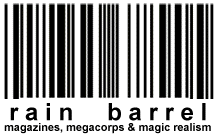
January 24, 2001

January 24, 2001
|
Which is completely true when you think about it (but not a sufficient reason to ban a book, mind you). Isn't that why we read books? To be changed by the experience? My fragile mind was irrevocably changed by a magazine that I stumbled upon when I was in high school. I still remember the chain of events that led up to my the encounter: I first stumbled upon Computer Lib / Dream Machines in the local public library. The forward of the book was penned by Stewart Brand, editor of something curious called the Whole Earth Catalog. I soon learned that my library had this 'bible of the sixties' and the well-stocked magazine store down the block had the catalogue's magazine equivalent: the Whole Earth Review. I bought a copy and it blew my mind. A subscription almost immediately followed. From the introduction of the most recent issue of what is now called Whole Earth:
Now - I know what you're thinking: anyone can make a list of what they think is best. But not very many people can make as interesting collection as Kevin Kelly. He brings to your attention such books and items as: an analog atomic clock, the trailmaster trial monitor, The Secret Musuem of Mankind, Extrodinary Chickens, President 2000 Barbie, Finite and Infinite Games, Great Courses on Tape, crystal set projects, shoebox holography, The Technology of Orgasm, Wacom Tablet, CapShare Portable E-Copier, sewing awl. A Framework for Understanding Poverty, Make Your Own Dinosaur Out of Chicken Bones, the Universe Map... Supplementing the catalog are the articles "How to Design a 10,000 Year Clock" by Danny Hillis, "Blogging" by Mark Frauenfelder, and an interview with artist and architect, Maya Lin. Whole Earth still bends my fragile mind. |
|